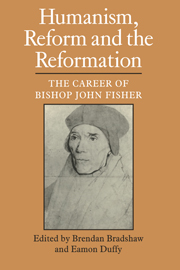Book contents
- Frontmatter
- Contents
- Preface
- List of abbreviations
- Bishop John Fisher, 1469–1535: the man and his work
- John Fisher and the promotion of learning
- The University chancellor
- The bishop in his diocese
- Fisher and Erasmus
- Fisher and More: a note
- The polemical theologian
- Fisher's view of the Church
- Fisher, Henry VIII and the Reformation crisis
- Royal ecclesiastical supremacy
- The spirituality of John Fisher
- Appendixes
- Index
Royal ecclesiastical supremacy
Published online by Cambridge University Press: 04 August 2010
- Frontmatter
- Contents
- Preface
- List of abbreviations
- Bishop John Fisher, 1469–1535: the man and his work
- John Fisher and the promotion of learning
- The University chancellor
- The bishop in his diocese
- Fisher and Erasmus
- Fisher and More: a note
- The polemical theologian
- Fisher's view of the Church
- Fisher, Henry VIII and the Reformation crisis
- Royal ecclesiastical supremacy
- The spirituality of John Fisher
- Appendixes
- Index
Summary
In the draft bull excommunicating King Henry VIII, of the year 1535, three themes are linked together as providing overwhelming grounds for the condemnation: the divorce of Catherine of Aragon, the claim to be supreme head of the Church of England, and the judicial murder of John Fisher. The saintly and renowned humanist Fisher, the man Henry VIII himself had been heard by Pole to describe as the most learned man he knew, is a symbolic figure by his unyielding opposition to the divorce and to the king's consequent expulsion of papal authority from his realm in response to the humiliation of Pope Clement's rejection. None of the three acts was well regarded in Europe at large, and together they looked like the tyranny of a Night of the Long Knives. Reginald Pole's Defence of the Unity of the Church must have been telling Henry what the king already knew when the writer observed that Henry's actions had brought political danger – whether from Charles V or from the French – a severing of a branch from the root of God's tree by rejecting the universality and unity embodied by Peter's see, and a threat of civil insurrection and future conflict about the succession to the throne once Mary had been declared illegitimate. That seemed a lot of trouble to buy. As for the title ‘head of the Church’, Pole acidly remarked that this head was chiefly noted for plundering the Church. It seemed absurd that one claiming such a title could not minister the sacraments, and yet could constitute himself as the judge of controversies in matters of faith.
- Type
- Chapter
- Information
- Humanism, Reform and the ReformationThe Career of Bishop John Fisher, pp. 169 - 204Publisher: Cambridge University PressPrint publication year: 1989



